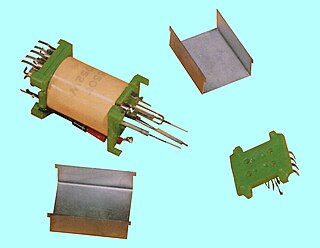
Telefonaktiebolaget LM Ericsson, commonly known as Ericsson, is a Swedish multinational networking and telecommunications company headquartered in Stockholm. The company sells infrastructure, software, and services in information and communications technology for telecommunications service providers and enterprises, including, among others, 3G, 4G, and 5G equipment, and Internet Protocol (IP) and optical transport systems. The company employs around 100,000 people and operates in more than 180 countries. Ericsson has over 57,000 granted patents.
The General Electric Company, or GEC, was a major British industrial conglomerate involved in consumer and defence electronics, communications, and engineering. The company was founded in 1886, was Britain's largest private employer with over 250,000 employees in the 1980s, and at its peak in the 1990s, made profits of over £1 billion a year.

Beeston is a town in the Borough of Broxtowe, Nottinghamshire, England, 3.4 miles (5.5 km) south-west of Nottingham city centre. To the immediate north-east is the University of Nottingham's main campus, University Park. The pharmaceutical and retail chemist group Boots is headquartered 0.6 miles (1 km) east of the centre of Beeston, on the border with Broxtowe and the City of Nottingham. To the south lies the River Trent and the village of Attenborough, with extensive wetlands.
The Plessey Company plc was a British electronics, defence and telecommunications company. It originated in 1917, growing and diversifying into electronics. It expanded after World War II by acquisition of companies and formed overseas companies.
The Marconi Company was a British telecommunications and engineering company that did business under that name from 1963 to 1987. Its roots were in the Wireless Telegraph & Signal Company founded by Italian inventor Guglielmo Marconi in 1897, which underwent several changes in name after mergers and acquisitions. The company was a pioneer of wireless long distance communication and mass media broadcasting, eventually becoming one of the UK's most successful manufacturing companies. In 1999, its defence equipment manufacturing division, Marconi Electronic Systems, merged with British Aerospace (BAe) to form BAE Systems. In 2006, financial difficulties led to the collapse of the remaining company, with the bulk of the business acquired by the Swedish telecommunications company, Ericsson.

Marconi Communications, the former telecommunications arm of Britain's General Electric Company plc (GEC), was founded in August 1998 through the amalgamation of GEC Plessey Telecommunications (GPT) with other GEC subsidiaries: Marconi SpA, GEC Hong Kong, and ATC South Africa.
GEC Plessey Telecommunications (GPT) was a British manufacturer of telecommunications equipment, notably the System X telephone exchange. The company was founded in 1988 as a joint venture between GEC and the British electronics, defence and telecommunications company Plessey. The next year, after a joint holding company of GEC and the German conglomerate Siemens AG acquired Plessey, GPT was converted into a 60/40 GEC/Siemens joint venture. The GPT name ceased to be used in the mid-1990s, and in 1998 the company was amalgamated into Siemens Communications.
System Y is the terminology used by BT, the main operator of the telephone network in the United Kingdom, to refer to the Ericsson AXE digital switching system.
The British Approvals Board for Telecommunications (BABT) is a telecommunications certification body.
Stromberg-Carlson was a telecommunications equipment and electronics manufacturing company in the United States. It was formed in 1894 as a partnership by Swedish immigrants Alfred Stromberg and Androv Carlson. It was one of five companies that controlled the national supply of telephone equipment until after World War II.

TXE, was a family of telephone exchanges developed by the British General Post Office (GPO), designed to replace the ageing Strowger systems.
Sir Peter Leahy Bonfield is a business executive who has led a number of companies in the fields of electronics, computers and communications. Currently a director of several companies in the USA, Europe and the Far East, he was formerly chief executive of ICL and more recently of BT Group. He is a Fellow of the Royal Academy of Engineering, the Institution of Engineering and Technology, the British Computer Society, the Chartered Institute of Marketing, the Marketing Society and the Royal Society of Arts. He is a Liveryman of The Worshipful Company of Information Technologists, Freeman of the City of London, Honorary Citizen of Dallas, Texas and Member of the Pilgrims of Great Britain.
TXK was a range of Crossbar exchanges used by the British Post Office telephone network, subsequently BT, between 1964 and 1994. TXC was used as the designation at first, but this was later changed as TXC sounded too much like TXE the code used for later electronic exchanges. Prior to this the GPO had standardised on Strowger for automatic switching and had resisted the adoption of Crossbar, preferring to wait for its electronic switching research to bear fruit. The development of electronic systems however took longer than anticipated and the British equipment manufacturers, particularly Automatic Telephone & Electric (ATE), which later became part of the Plessey group feared that continuing to focus the bulk of their production on Strowger equipment would harm their export sales as Crossbar had already become popular throughout the world.

In electronics, a Dekatron is a gas-filled decade counting tube. Dekatrons were used in computers, calculators and other counting-related products during the 1950s and 1960s. "Dekatron," now a generic trademark, was the brand name used by Ericsson Telephones Limited (ETL), of Beeston, Nottingham.
Howard & Wyndham Ltd was a theatre owning, production and management company of John B. Howard and Frederick W. P. Wyndham, founded in Glasgow in 1895, and which became the largest of its type in Britain. The company continued well into the 20th century; its theatres being eventually sold in the 1960s, and the shareholding coming under American control.

Megger Group Limited is a British manufacturing company that manufactures electronic test equipment and measuring instruments for electrical power applications.
Sir John Allen Clark was managing director of the British Plessey Company, an electronics and telecommunications group built up by his father, Allen George Clark. His career with Plessey was dominated by a battle with Arnold Weinstock of GEC for control of the company together with English Electric from the 1960s. This culminated in the late 1980s with the takeover and break-up of Plessey.

Gábor Kornél Tolnai, born November 22, 1902 in Budapest, died on February 3, 1982 in Stockholm, was a Hungarian-Swedish Diploma engineer, inventor, constructor, mechanical engineer, precision engineer, electrical engineer and a self-employed person. He is best known for his inventions and patents for spinning machines, devices for the Swedish National Defense and several types of tape recorders.
The Automatic Telephone and Electric Company







